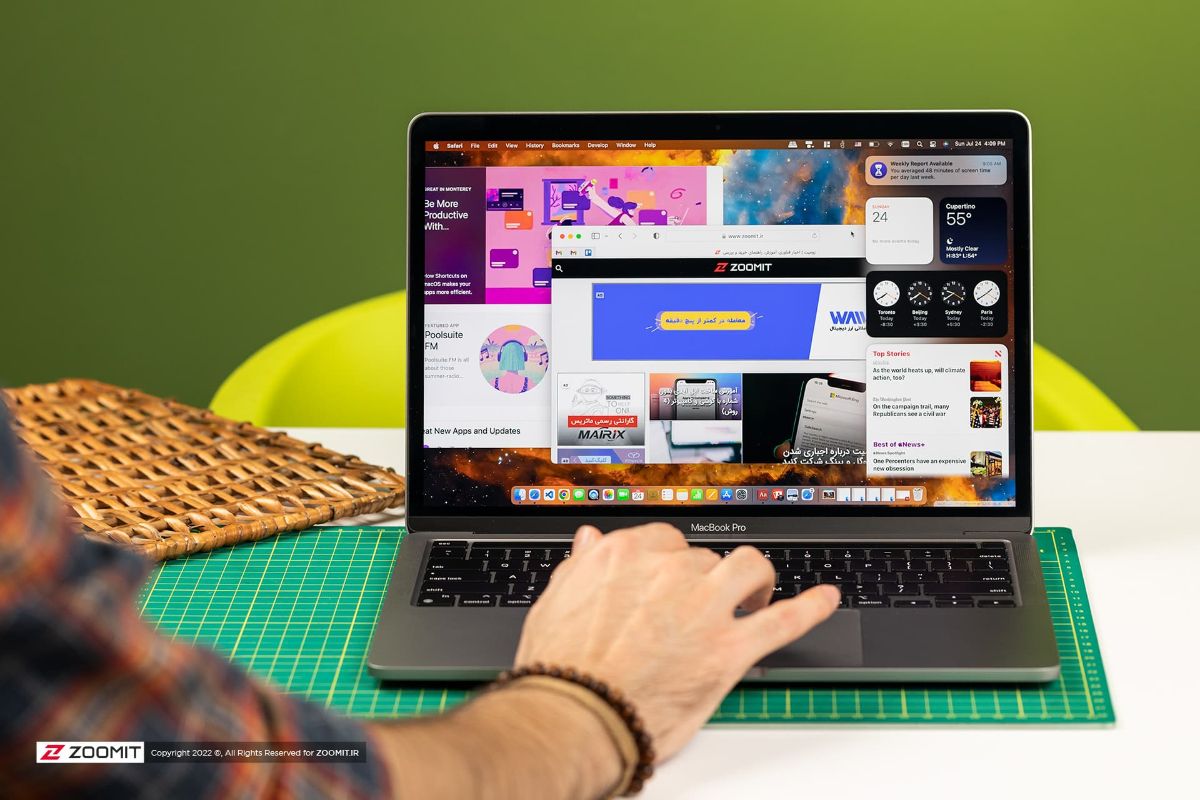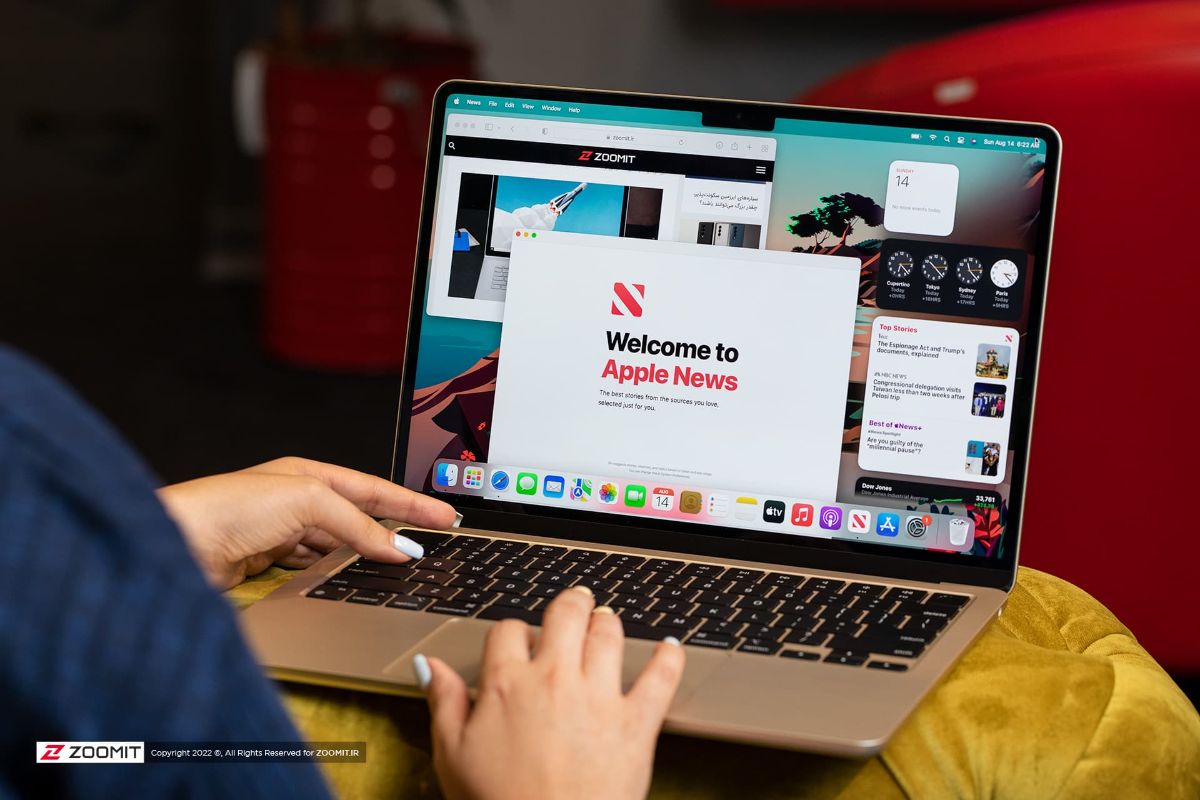Introducing the best free and paid antivirus for Mac
Contrary to popular belief, macOS is not immune to malware. This article introduces the best free and paid antiviruses for Macs.
MacBooks are less likely to be targeted by malware and viruses than Windows computers, but they are not entirely immune to cyber attacks. Even if you don’t care about annoying ads or if your device becomes a tool for infecting users on other platforms, there is still a chance that you will become a victim of ransomware, password theft, or your phone backup.
Table of Contents
- The best free antivirus for Macbook
- Comodo Antivirus
- The best-paid antivirus for MacBook
- Does Mac need antivirus at all?
- How to increase the security of your MacBook?
The best free antivirus for Macbook

Unfortunately, the number of free antiviruses for Mac that can detect all types of malware is few, and it is much less than the versions specific to Windows. However, in the list below, we have introduced a few antiviruses for Mac that, while accessible, also do their job well in preventing the system from getting infected. Of course, remember that some of the introduced antiviruses have free and subscription versions.
Malwarebytes Antivirus
Malwarebytes Antivirus claims to be able to scan the entire Mac system in less than 30 seconds, and if it finds any suspicious ones, it will provide the user with a list of possible threats. The user then has the choice to ignore the listed threats, quarantine them, or remove them altogether.
The free version of Malwarebytes helps the user identify various types of malware quickly, but it does not provide sufficient protection against potential damage. Users can use the premium version of this antivirus for free for 14 days to get to know more about its features.
AVG Antivirus for Mac
AVG Antivirus is one of the few free antiviruses for Mac that adequately protects users from all kinds of malware, including viruses and spyware.
Despite being free, AVG Antivirus fulfills almost all your expectations from an antivirus, Including blocking the access of viruses and malware when visiting infected websites, downloads, and even email attachments. This antivirus scans all applications and system files and removes threats from your Mac. AVG also updates automatically, so you don’t have to worry about updating the app.
The free version of AVG Antivirus will probably get you started; however, if you’re looking for more advanced features, you’ll need to pay $2.50 monthly subscription to this antivirus. Of course, the paid version of AVG also benefits from a 60-day trial period.
Sophos Home Antivirus
The paid version of Sophos Home Antivirus comes with a 30-day free trial version, and at the end of this trial period, there is no need to purchase the premium version; You do lose some of the premium features you’re used to, though. In any case, the same free version will get you started.
Sophos Home Antivirus is fully aware of the user’s MacBook and constantly looks for viruses, trojans, worms, bots, and any other malware that might harm your Mac.
Sophos Home Antivirus also includes an option to choose the level of access children have to websites. The free plan of this antivirus supports three devices simultaneously, both Mac and Windows.
Comodo Antivirus
Comodo Antivirus has an easy-to-use interface and protects your MacBook against malware for free. Drag and drop it into the Comodo environment to see if a file or program is infected with a virus.
This antivirus features a quick scan that finishes in seconds, but a full system scan may take an hour or two. The Scheduler option also allows you to choose your desired time to perform the scan so that running the antivirus does not cause a problem in the device’s performance when you are busy working with your computer.
Comodo Antivirus, like the other antiviruses on this list, is constantly updated to protect the user’s system against the latest types of malware. Just be aware that Comodo doesn’t automatically protect you online. To block websites infected with malware, you need to download the Comodo Online Security browser extension, which is also free.
Bitdefender Virus Scanner Antivirus
Bitdefender Virus Scanner doesn’t have many flashy features, but it’s not a wrong choice for a free Mac antivirus. This antivirus is especially suitable for scanning the files and programs you want. If a threat is found, BitDefender quarantines or removes it. With this antivirus, you can also delete files to make scanning faster.
Bitdefender Antivirus does not run in the background, so you have to run the program yourself each time to scan the system. But it is automatically updated every hour to protect the system against the latest types of malware.
The only problem with Bitdefender is that it lacks a tool to protect your MacBook on the Internet. If you want to protect your system against dangerous websites or phishing emails, choosing another antivirus from this list is better.
Avira Free Security Antivirus
Avira Free Security antivirus is available for both Mac and Windows users; therefore, it is considered one of the best free antiviruses for Windows and macOS computers.
This antivirus can detect malware that is dangerous for both Mac and Windows, thus preventing you from accidentally transferring malware from your Mac to another user’s PC.
Although Avira antivirus is free, it has many valuable functions; For example, the scanner can scan the entire system or only specific files; You can even set a particular time for the system scan so that Avira only runs at specified times. This antivirus also uses a firewall, disk space cleaner, battery optimization, and startup features.
However, remember that scanning the entire system takes a long time and usually slows down your device. Therefore, it is better to use a quick scan regularly instead of a full scan so that the performance of the Mac does not decrease.
Avast Security Antivirus
Avast Security Antivirus is an excellent choice for any Mac user. It has many features that protect your system against ransomware, viruses, and other malware that compromise Mac security.
When you’re browsing the Internet and coming across a website infected with malware, Avast Security will notify you to avoid visiting it and prevent websites from tracking you. Avast Antivirus even blocks infected emails and tells you if your Wi-Fi connection encounters any security issues.
Since Avast Security Antivirus is free, it offers some additional features, including a warning of anonymous connections to the user’s Wi-Fi network and protection against ransomware, only in the premium version.
The best-paid antivirus for MacBook

Unfortunately, the best MacBook antiviruses, like the best of any other product, are paid, and most offer monthly or annual subscriptions; Some of the free antiviruses introduced in this article also include premium versions that provide the user with more functionality. Some of the best-paid antivirus for MacBooks have received high scores from independent antivirus testing labs, including AV-Test and AV-Comparatives.
Bitfinder Antivirus
Among MacOS antiviruses that have been reviewed by independent antivirus testing labs and scored based on efficiency and performance, Bitdefender Antivirus scores highly, with a 100% malware detection rate in many cases.
Bitdefender Antivirus works in the background in the best possible way while minimizing the need for user interaction in the default Autopilot mode; It can be said that it offers the most protection against all types of malware.
The Mac version of this product does not have the many features of its Windows version, but it still outperforms many Mac antiviruses. The tracker-blocking system of this antivirus prevents the tracking of websites and, like the Windows version, constantly protects the system against ransomware.
In addition to protecting the user from malicious websites, the Bitdefender Traffic Light browser extension also marks search results based on whether they are safe or dangerous with green and red icons so that you can click on them with more knowledge.
Intego Antivirus
Intego develops software exclusively for the Macintosh, and its antivirus and related products are available only for the Mac. Like Bitdefender, Intego Antivirus has scored highly in independent labs and is only slightly behind its competitor.
Like most security products, Intego Antivirus offers a free version called VirusBarrier Scanner. The mid-range version of this antivirus is called Mac Internet Security X9, and its premium version, Mac Premium Bundle X9, benefits from more features, including firewall and system optimization. According to Intego, the virus detection software of this product is updated more than 100 times a day.
Intego Antivirus also scans iOS devices via Bluetooth connection. It has little impact on system performance, works fast, and doesn’t support Android phones.
Norton Antivirus
Unsurprisingly, Norton Antivirus is second only to Bitdefender on many websites’ best-of-the-best lists. Norton has a long history in computer security, and when it was called Symantec, it developed antivirus for DOS computers in 1989; For this reason, Norton can be considered the grandfather of antiviruses.
It is interesting that Norton even has a team of researchers who use machine learning and virtual machines to identify new and unknown viruses or “zero-day” viruses and then store their IDs in the cloud.
Although the Norton subscription service costs more than other antiviruses, it uses many features. If it cannot detect malware infection in your system in some cases, it will return all the paid costs to you.
Norton’s antivirus plans include AntiVirus Plus, Norton 360 Standard, and Norton 360 Premium. The main feature of these plans, malware detection, is the same in all of them. Even AntiVirus Plus, the cheapest plan, benefits from additional features such as a firewall, password management, and 50 GB of cloud space. Remember that cloud backup is not available for macOS and only for Windows.
Does Mac need antivirus at all?

There was a time when many people thought that only the Windows operating system was the target of malware attacks; This was because the most common operating system is Windows, and hackers designed viruses and malware according to this operating system. The Windows operating system continues to struggle with the challenge of malware, and its older versions are more vulnerable to cyber attacks than any other system. Still, malware is by no means limited to Windows computers, and any device capable of connecting to the Internet, including MacBooks, faces the threat of malware.
For years, it was thought that the Mac operating system was utterly immune to malware attacks. But during the 1990s, malware was designed that target the Windows operating system; But it could also infect Mac OS. Between 1995 and 1998, malware such as Concept and Laroux infected Macs running Microsoft Office applications. Of course, this malware was not malicious, and in the case of Concept, only a message with the title “1” was displayed on PC and Mac, and Laroux only opened a macro page with the same name in the user’s Excel project.
But in the mid-2000s, hackers began designing malware that targeted the Mac operating system.
Although Windows devices continue to bear the brunt of malware attacks, The Mac operating system is regularly targeted by cybercrimes, including backdoor Trojans, malware downloads, and ransomware attacks.
Last year, malware called Silver Sparrow was detected in MacBooks equipped with the M1 chip and infected hundreds of thousands of MacBooks. Also in 2016, KeRanger, the first Mac-specific ransomware attack, targeted users and, by encrypting their personal information, demanded a bitcoin ($400 at the time) from each to return the data. More than 7 thousand Mac users were infected with this ransomware.
Although Unix is the Mac operating system and its “sandbox” modification prevents the infection from spreading to other parts of the system, and in this sense, it is less vulnerable compared to Windows. However, it is not entirely immune, and if you want to protect your MacBook from Keep safe from the risk of malware, it is recommended to use an antivirus.
How to increase the security of your MacBook?
- Do not use the admin account for daily use.
- Use sandbox browsers like Chrome.
- Disable or remove software such as Flash Player and Java if not needed.
- Keep your operating system and other software up to date.
- Use a strong password (Mac has powerful password management software).
- Disable services such as Bluetooth, Airport, and IPv6 that you do not use.
- When installing new software, be sure of their authenticity and only download from reputable websites.

